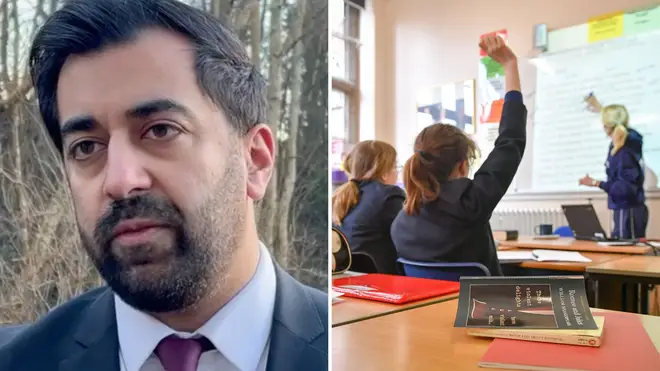
Lewis Goodall 10am - 12pm
11 January 2024, 07:05

Chairs flying at heads, kicks, punches, bites - just some of the violence teachers in Scotland have exclusively told LBC is escalating because of the Scottish government's 'inclusion strategy'.
The policy prevents teachers from singling children out, by extension banning them from handing out consequences like detention, sending pupils out of class, suspending them and even raising voices.
Instead, educators are told to focus on 'restorative methods' as children shouldn't be removed from classrooms no matter what they do.
One teacher, Abigail, has been in the profession for four years and has told LBC the level of violence she deals with.
"I had a boy who used to throw a chair at my head every week. Children push me, children run full pelt into you and knock you over, kick you. I've got children that have smashed windows, children who have kicked holes in the walls and I'm like 'What happens if that's me?'" she said.
"The violent incidents are getting more and more violent - you've got children coming in with knives. I'm beginning to become a frontline worker and that's not what I signed up for."

Teacher on violence from children in the classroom
Tara - a primary teacher - has had similar experiences: "You do think 'Why am I getting up and going to work to get hit and punched and kicked?' You wouldn't take that in any other profession. There would be a total outrage about that. How mental is that, that we're showing each other our bruises and bite marks from work?"
Another teacher, Andrew, says management and policy-makers are well aware of what teachers are going through: "There's definitely pressure to under-report [abuse] - a move to blame teachers when something like this happens."
A friend of his, Helen, has been signed off work after being injured by a pupil.
She told LBC what she has been dealing with: "Biting, scratching, kicks, slaps, being punched, having my hair pulled to the extent that clumps have been pulled out. I've been bruised so many times I've lost count.
"While management are supportive, ultimately it always comes down to what I could have done differently. Where else is this kind of victim blaming ok?"
Each of these teachers agrees one thing is making classroom violence worse: the inclusion strategy.
The nationwide policy is still to keep violent children in the classroom, leading to long-term problems, according to Abigail.
"Children need to know that actions have consequences," she said.
"If you go the whole way through school with no consequences we're just doing you a disservice because when you get out of school, and you go to work and you hit your boss - that's you sacked, that's you with a criminal conviction, that's you straight into jail because life has consequences."

Teacher on violence from children in the classroom
Read more: Nick Ferrari blames 'lazy, irresponsible parents' for rising absenteeism in schools
Tara said: "Everything is all about nurture now, which is hugely important, we have to have that nurturing environment for children - no doubt about it.
"But there has to be consequences. You're not setting children up for real life by rewarding them for their awful behaviour."
The impact of attacks and abusive behaviour towards teachers is evident in figures provided to LBC by Scotland's largest teaching union.
80% of the Educational Institute of Scotland said they were considering leaving teaching altogether because of violence and aggression. The largest numbers are seen in Aberdeen City at 93.1%.
In the same survey, 72% reported violence and aggression has worsened over the last four years.

First Minister Humza Yousaf on violence in the classroom
EIS general secretary Andrea Bradley has told LBC the figures are unsurprising and signal a crisis where teachers are consistently "put at risk".
"There becomes a tipping point at which [violence] becomes intolerable and we do know that members are signed off because of work-related stress," she said.
"Every single person who uses a school building, either as a learner or as a worker, has a right to be protected in that environment.
"There is no hierarchy of rights here. Their right to safety and security in their workplace, it's protected in legislation, it's the law. It shouldn't be a lottery."
Ms Bradley says the impact goes further than just teachers: "Violent, aggressive, disruptive, distressed behaviour such as it is at the present time in our schools is impacting negatively on teaching and learning for all children - not just those who are exhibiting that kind of behaviour. That is not going to be good long-term for educational outcomes."
Many teachers say they feel unsafe in the workplace while non-disruptive pupils often tell them they're 'scared'.
LBC asked First Minister Humza Yousaf to address the concerns raised by his educators.
"We engage regularly with teachers whether it's directly or indeed through our engagement with the EIS," he said. "Of course, the cabinet secretary for education has hosted a number, now, of summits particularly on the issue of violence in schools.
"Now we want to get that balance right between ensuring that, even where children are causing issues are causing problems, that we don't simply remove them from education entirely but also ensuring that teachers are feeling safe.
"So, if they're not feeling safe, as some teachers have told LBC, then that's an issue of real concern so we'll continue to engage with them directly and make sure that we're getting that balance right and making sure that we're supporting the teaching profession as best we can."
Last year compensation worth £541,499 was paid out to teachers in the EIS for injuries including broken teeth and a fractured jaw.
We've also learned that, since 2018, more than 1,300 teachers in Scotland have quit within their first five years.
Without change, unions are warning experienced teachers will continue to leave the profession while recruitment gets ever-harder.
Teachers' names have been changed for anonymity.